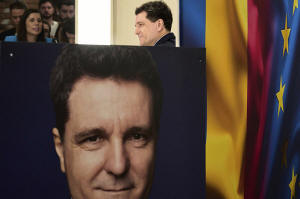Romania braces for crossroads presidential runoff viewed as a choice
between East or West
[May 16, 2025]
By STEPHEN McGRATH
BUCHAREST, Romania (AP) — As Romania braces for a high-stakes
presidential runoff this weekend between two starkly different
candidates, 25-year-old medical resident Alexandra Bejinariu is anxious
about which direction her European Union nation will choose in the
closely watched vote.
Like many voters, the young medic views Sunday’s ballot between
hard-right nationalist frontrunner George Simion and pro-Western
reformist and incumbent Bucharest Mayor Nicusor Dan as a choice for the
country's geopolitical future.
It's a choice between “East or West,” she told The Associated Press in
Bucharest. “It has divided my family, my relatives, my friends,” she
said.
Romania is gripped by a deep political crisis after a top court voided
the previous election in which the far-right outsider Calin Georgescu
topped the first round, following allegations of electoral violations
and Russian interference, which Moscow has denied.
A nation divided by election crisis
Deep societal divisions have been exposed during Romania’s chaotic
election cycle, and Bejinariu said she fears that a Simion presidency
would undermine Romania’s long-standing Western alliances. “I think it’s
a big risk,” she said.
“It has to change, but I don’t know in what direction it will change,"
she added. "I hope that our future will be good … it really gives me
anxiety this election."

After coming fourth in last year’s canceled race, Simion, the
38-year-old leader of the Alliance for the Unity of Romanians, or AUR,
backed Georgescu who was banned in March from standing in the redo.
Simion then surged to frontrunner in the May 4 rerun after becoming the
standard-bearer for the hard right.
Years of endemic corruption and growing anger toward Romania’s political
establishment has fueled a surge in support for nationalist figures,
reflecting a broader pattern seen across Europe.
The AUR party says it stand for “family, nation, faith, and freedom" and
rose to prominence in a 2020 parliamentary election. It has since grown
to become the second-largest party in the Romanian legislature.
To his critics, Simion is a pro-Russian extremist who threatens
Romania’s longstanding alliances in the European Union and NATO. But in
an AP interview last week, he rejected the accusations, saying Russia is
his country's biggest threat, and that he wants Romania to be treated as
“equal partners” in Brussels.
“Some fake news were saying that we want to exit the European project,"
he said. "Tough luck."
Local surveys indicate a tight race
Most recent local surveys indicate the runoff has narrowed to a near
tie, after earlier ones showed Simion holding a lead over Dan, a
55-year-old mathematician who rose to prominence as a civic activist
fighting against illegal real estate projects.
Dan founded the reformist Save Romania Union party in 2016 but later
left, and is running independently on a pro-EU ticket, reaffirming
Western ties, support for Ukraine, and fiscal reform. At a rally in
Bucharest on Sunday, he also addressed the growing tensions.
“How did it come to this, that in a country with hardworking, decent
people, there is so much hatred and division, that families and circles
of friends are torn apart over political opinions,” he said. “We need to
project hope.”

Simion, also a former activist who campaigned for reunification with
neighboring Moldova, says he would focus on reforms: slashing red tape,
reducing bureaucracy and taxes. But he insists that his main goal is to
restore democracy. “My platform is to return to democracy, to the will
of the people,” he said.
The presidential role carries a five-year term and significant
decision-making powers in national security and foreign policy.
A choice for geopolitical future
Siegfried Muresan, a Romanian member of the European Parliament, told
the AP that Sunday's vote is the first election since communism ended in
which Romania’s geopolitical orientation is at stake.
[to top of second column]
|

Presidential candidate Nicusor Dan holds a press conference the day
after making it into the round of the country's presidential
election redo in Bucharest, Romania, Monday, May 5, 2025. (AP Photo/Vadim
Ghirda, File)

“The election is about choosing between the European model, the European
way of life, which is based on democracy, freedom of expression, freedom
of press, rule of law, development, unity, solidarity," he said. "And
the Russian model, which is the exact opposite — it’s more than just the
presidential election.”
In a local televised debate last week, Simion railed against EU
officials whom he called the “globalists in Brussels,” and voiced
admiration for Hungary’s Prime Minister Viktor Orbán, a longtime critic
of the 27-nation bloc.
“That is precisely why many of his positions, not all … will be state
policy in Romania,” said Simion, who opposes further military aid to
neighboring Ukraine or sending troops from NATO countries to protect any
peace agreements, fearing escalation.
Simion's activities in Moldova led to allegations he was trying to
destabilize the country and a ban on his entry there. He is also banned
from entering Ukraine for “systemic anti-Ukrainian” activities.
Moldova's pro-Western President Maia Sandu posted a public message this
week in support of Dan, saying Moldovans understand the value of being
"part of the European family,” and urged Moldovans with dual Romanian
citizenship to vote to ”protect what Romania has already achieved, but
which is now under threat."
Turnout could decide vote outcome
In the first round on May 4, Simion won a massive 61% of Romania’s large
diaspora vote, with his calls to patriotism resonating with Romanians
who moved abroad in search of better opportunities.
Claudiu Tufis, an associate professor of political science at the
University of Bucharest, says Sunday's result will likely boil down to
turnout, which is often higher in the second round vote. “Turnout will
be the key," he said. He added that Simion lacks adequate experience for
high office and fears he would quickly target civil society
organizations.

“That is a significant problem,” he said. “What is driving him is his
focus on identity politics. He has absolutely no experience when it
comes to foreign policy ... economy, and no experience when it comes to
public administration."
For energy sector worker Rares Ghiorghies, 36, Simion represents a new
form of patriotic conservatism that he feels is needed to overhaul an
outdated political class.
“I think about freedom, dignity, equal rights for everyone, prosperity,
and healthy principles, not what we have now: manipulation, censorship,
and incompetence in everything related to the state system,” he said.
“We need a role model, a patriot who knows that you can achieve more
with your heart than with your brain,” Ghiorghies said.
Tensions in society are being further amplified online, where networks
of coordinated disinformation have emerged as a pervasive force through
the entire election cycle.
Disinformation deluge ramps up for runoff
Cyabra, an AI-powered platform that studies online influence campaigns,
analyzed hundreds of comments on both candidates’ official X accounts
after the first round, and concluded that a large percentage came from
fake accounts.
Those posts reached a peak on the day of the election and the day after
in what appeared to be a synchronized campaign, the group said, with
most of them criticizing Dan using rhetoric such as “foreign puppet," or
praising Simion with slogans such as “Well done, Romania!”
Andrei Grajdeanu, a 34-year-old dental technician, says he feels
Romanians were long divided but that social media has exposed the
division.
“I think everybody needs to go to the vote to express their opinion, and
that’s it," he said. "Don’t fight with family, friends, or each other."
All contents © copyright 2025 Associated Press. All rights reserved |